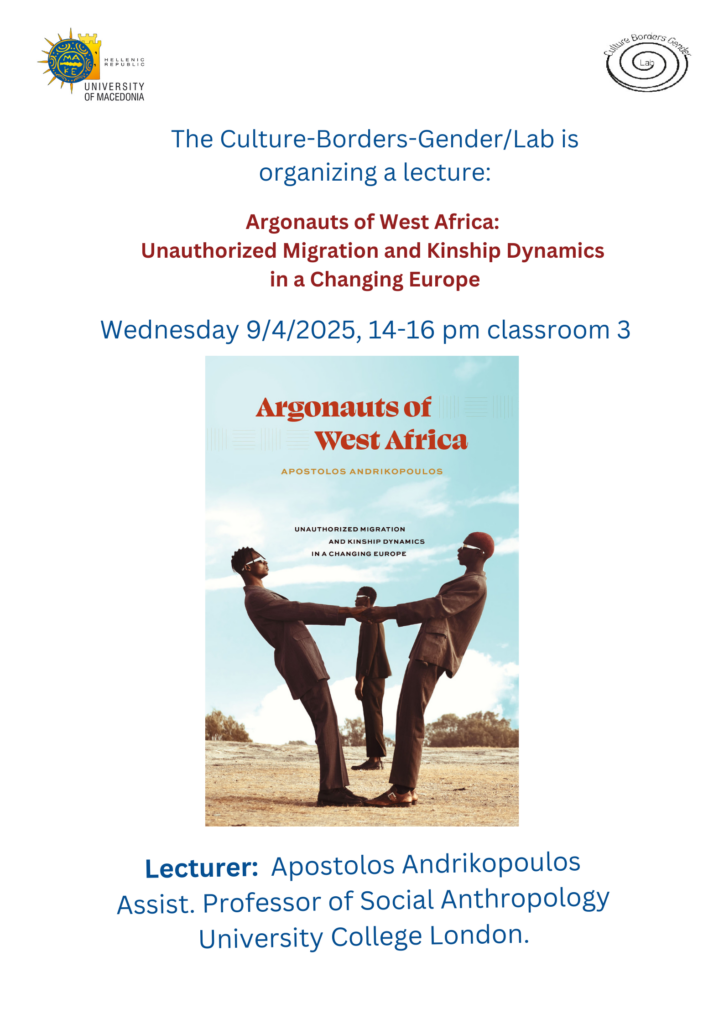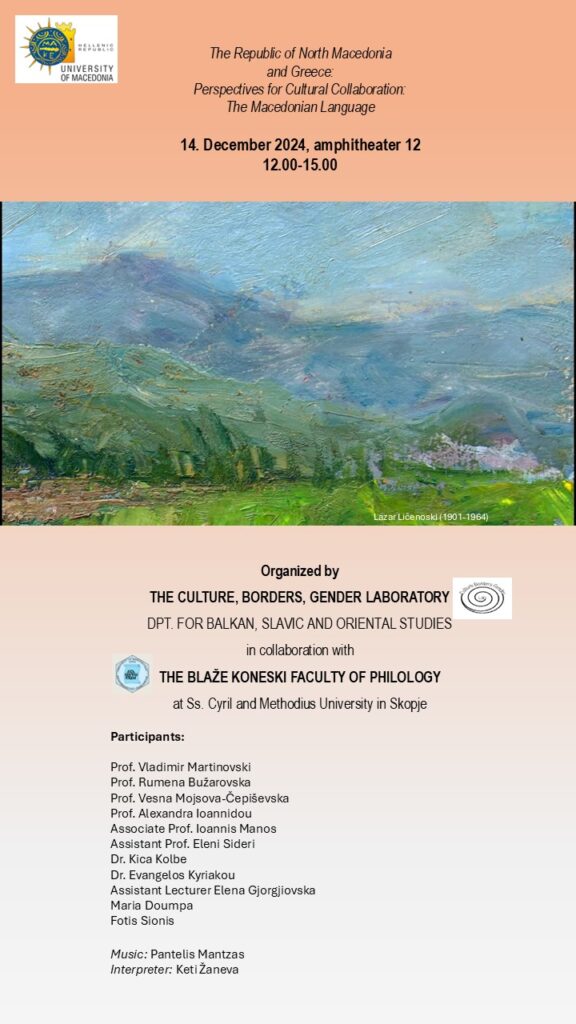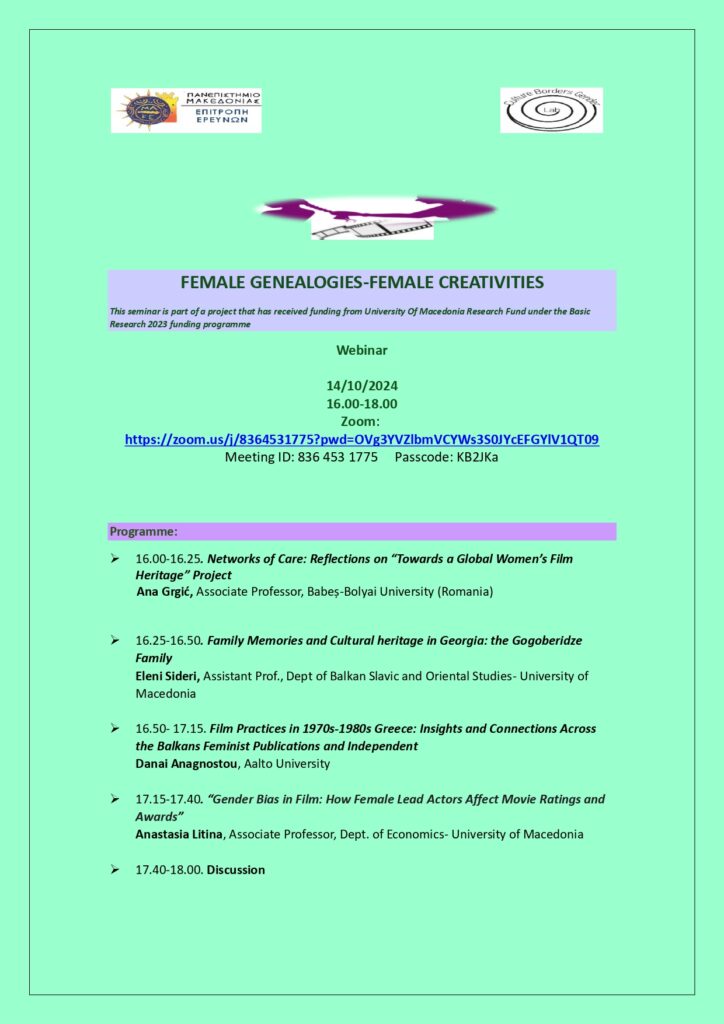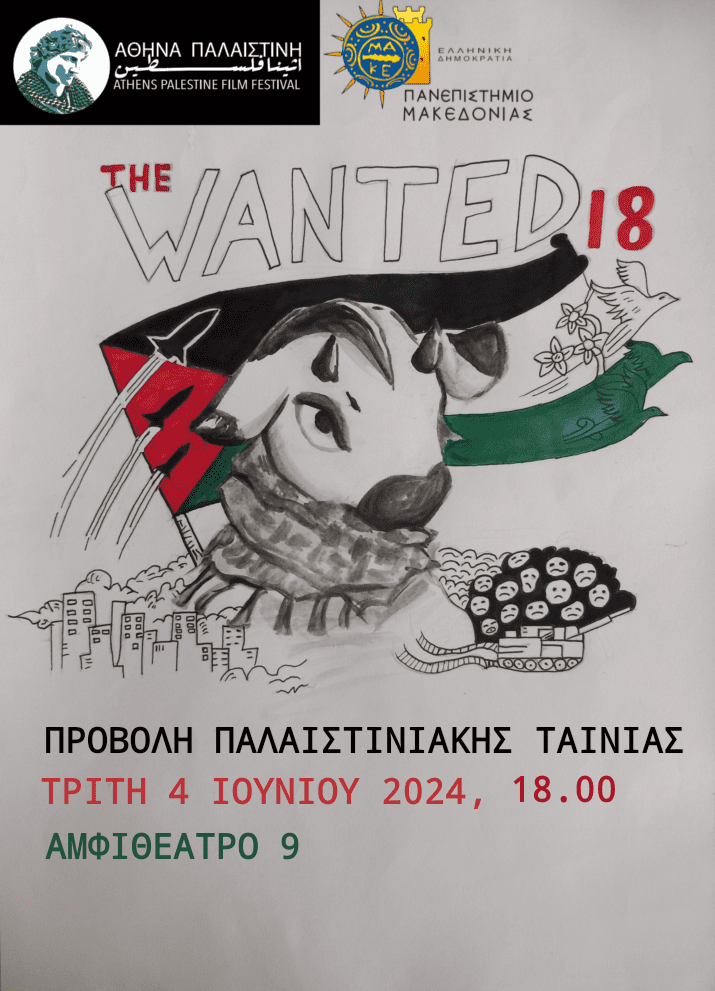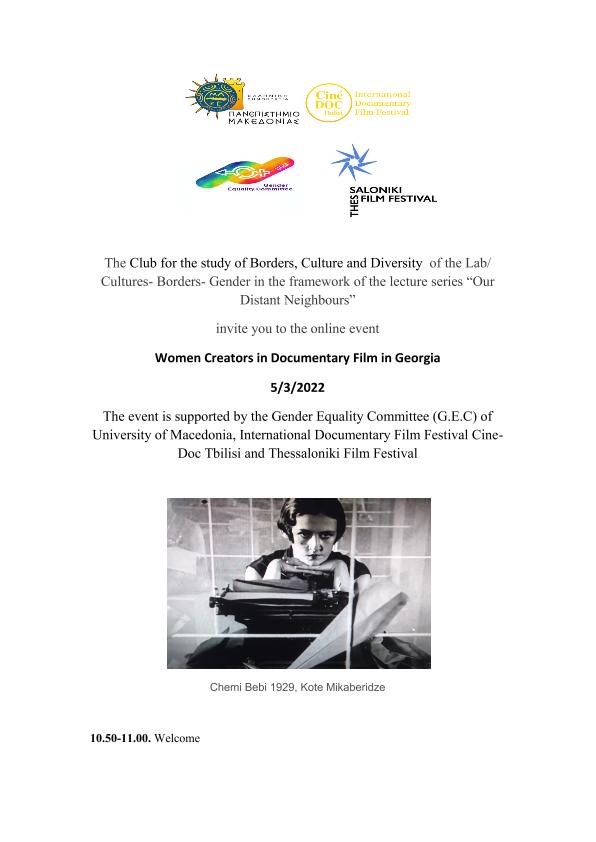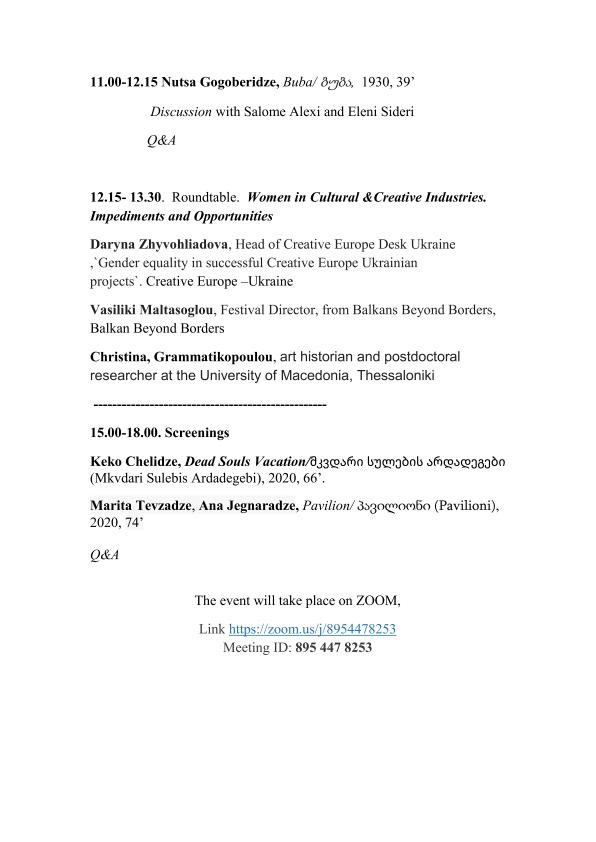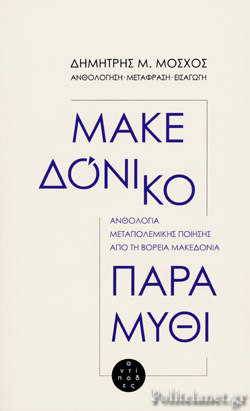This seminar is part of a project that has received funding from University Of Macedonia Research Fund under the Basic Research 2023 funding programme
14/10/2024
16.00-18.00
Zoom: https://zoom.us/j/8364531775?pwd=OVg3YVZlbmVCYWs3S0JYcEFGYlV1QT09
Meeting ID: 836 453 1775 Passcode: KB2JKa
Patriarchal structures have caused gender segregation and socio-political and economic inequalities for women for centuries. They also contributed to the formation of female intimacies, networks and solidarities which tried to overcome the impediment of being a woman in “a man’s world”. The webinar will explore how shifting our attention to female genealogies as narratives, histories and/or practices of sharing, caring and support could help address the challenges that women in cultural industries, especially cinema, face. What kind of ingenuities do women conceive, develop in order to overcome social, economic or cultural obstacles? In what way, do they use their creativity to fight against structural and social handicaps? How do the successes or even failures of other women contribute to the production of female genealogies?
Programme:
- 16.00-16.25. Networks of Care: Reflections on “Towards a Global Women’s Film Heritage” Project
Ana Grgić, Associate Professor, Babeș-Bolyai University (Romania)
- 16.25-16.50. Family Memories and Cultural heritage in Georgia: the Gogoberidze Family
Eleni Sideri, Assistant Prof., Dept of Balkan Slavic and Oriental Studies- University of Macedonia
- 16.50- 17.15. Film Practices in 1970s-1980s Greece: Insights and Connections Across the Balkans Feminist Publications and Independent
Danai Anagnostou, Aalto University
- 17.15-17.40. “Gender Bias in Film: How Female Lead Actors Affect Movie Ratings and Awards”
Anastasia Litina, Associate Professor, Dept. of Economics- University of Macedonia
- 17.40-18.00. Discussion
Abstracts:
- Networks of Care: Reflections on “Towards a Global Women’s Film Heritage” Project
Ana Grgić, Associate Professor, Babeș-Bolyai University (Romania)
This talk reflects on the aims, challenges and outcomes of the project “Global omen’s Film Heritage, on which I collaborated with my colleagues Stefanie van de Peer and Lizelle Bischoff. Our desire was to counter the dominant patriarchal attitude of “benign neglect” (Tucker 1983) to presences and absences in the archive, which diminishes and neglects women’s activities and labour in film history. This project brought together scholars, archivists and filmmakers, to address the gaps in our shared histories and knowledge, with a particular focus on women’s cultural memory and film heritage from the Global South. This reflection takes into account two years of networking, workshops and conferences, where women from across the globe met and shared passions, frustrations, knowledge and experiences on their encounters with or in film archives and restoration projects. At the intersection of feminist, anti-racist and anti-colonial studies, and through a self-reflexive and critical approach to our own work and activities, we sought to address questions surrounding the gaps in historical knowledge on women’s activities (especially non-White feminist film history), the unremembered, and the selectivity of cultural memory. I argue that our work and research as a women’s collective constitutes one example of the need and effort to decolonize film history in an active feminist way through “an ethics of care” (Thompson 2015).
- Family Memories and Cultural heritage in Georgia: the Gogoberidze Family
Eleni Sideri, Assistant Prof., Dept of Balkan Slavic and Oriental Studies- University of Macedonia
Three generations of women creators of Georgian cinema belonging to the same family, the Gogoberidze family, will form the basis for this research, which aims to explore the notion of female genealogy through a multimodal ethnography. What type of memories does this female genealogy shape and how is it shaped by them? Focusing on a specific example of (auto)biography-memory, I will try to explore the ways affective memory and emotions as well as creativity generate family and cultural heritage and shape a female genealogy.
- Film Practices in 1970s-1980s Greece: Insights and Connections Across the Balkans Feminist Publications and Independent
Danai Anagnostou, Aalto University
This contribution addresses persistent issues related to the documentation and accessibility of alternative film production histories and draws inspiration from the enduring legacies of historical film collectives. In my doctoral research, I delve into the historical facets of film collectives and group formations in cinema by examining archival materials, auto-theoretical texts, and publications related to film practice and production culture. I seek materials authored by filmmakers and film workers themselves. Employing Production Studies as a theoretical framework, I explore existing scholarly analyses of film production. However, there is a notable absence of texts on film production histories and critical perspectives authored by practitioners actively involved in filmmaking. This realization led me to auto theory—the blending of theory, philosophy, and autobiography (Fournier, 2021)—which shifted my focus toward locating texts and communication artifacts created by filmmakers themselves. Early in my research, I encountered several Greek independent feminist publications, such as Skoupa (Broom, 1979–1982), Musidora (1984–1985), and Poli Gynaikon (Women’s City, 1982–1985). The authors of these publications address a wide range of topics and occasionally contain critiques, manifestos, and calls for action relating to film praxes. While these publications often seem influenced by Western perspectives, my research aims to explore how feminist discourse and initiatives shaped independent filmmaking in Greece and other Balkan regions. Specifically, I seek to identify discourse and dissemination practices of short and hybrid film formats within feminist circles during that era. The literature review centers on examining independent publications that address film production and culture from the perspective of feminist groups primarily from Greece, engaged in archival research and reviewing relevant materials. Furthermore, the study explores whether these groups have taken a step further in organizing independent and short film exhibitions and screenings. Writing and taking control of one's narrative, whether individually or collectively, is seen as a means of healing and bringing everyday working life into theoretical discourse. Positioned at the intersection of Production Studies, histories of film collectives, and auto theory, my research endeavors to bridge documentation gaps, foster cross-generational dialogues about diverse approaches to filmmaking, and ultimately preserve the histories of independent film production.
- “Gender Bias in Film: How Female Lead Actors Affect Movie Ratings and Awards”
Anastasia Litina, Associate Professor, Dept. of Economics- University of Macedonia
The study looks at how movies with female lead actors are rated and how many awards they win. It finds that when a movie has one or two female leads, it tends to get lower ratings from viewers but wins more awards. However, when all three leading roles are filled by women, this pattern fades, and the movie’s ratings and awards don’t change much.
The study suggests that men tend to give lower ratings to movies with female leads, which could hint at some bias. Interestingly, when female involvement is less obvious, like when a woman is a producer, the movie tends to get higher ratings. This points to the possibility that when female roles are less visible, people rate the movie more favorably, hinting at underlying gender bias.
In conclusion, understanding gender diversity and its impact on film ratings and awards provides valuable insights into the broader dynamics of the movie industry. As representation continues to evolve, recognizing how gender perceptions influence both audience reception and critical acclaim is crucial for fostering a more inclusive and equitable film sector. This understanding is not only relevant for addressing bias but also for promoting diversity, which can lead to richer and more varied storytelling that resonates with diverse audiences.
Bios:
Danai Anagnostou is a researcher in production studies. She studies film collectives and their influence on contemporary conducts and strategies for producing films, and works on her doctoral thesis at Aalto University, funded by Kone Foundation. She has co-founded Kenno Filmi, a cooperative production company, invested in producing artist-led films and audiovisual works
Ana Grgić (PhD, University of St Andrews) is Associate Professor at Babeș-Bolyai University (Romania), specialising in Balkan and East European cinemas, women’s film heritage, visual culture and film history. She is author of Early Cinema, Modernity and Visual Culture: The Imaginary of the Balkans (Amsterdam University Press, 2022), and co-editor of Stretching the Archive – Global Women’s Film Heritage (Archive Books, 2024) and Contemporary Balkan Cinema: Transnational Exchanges and Global Circuits (Edinburgh University Press, 2020).
Anastasia Litina is an Associate Professor at the University of Macedonia in Thessaloniki, Greece and an Extramural Research Fellow at the University of Luxembourg. She received her Ph.D. in Economics at the University of Macedonia, visited Brown University for a semester and worked at the University of Luxembourg as a post-doctoral researcher prior to her employment in Greece. Her research interests include a theoretical and empirical examination of the long-run determinants of growth, on the implications of various dimensions of culture (e.g., corruption, religiosity, environmental attitudes) for socio-economic outcomes, the social implications of population aging, as well as on the long-lasting effect of historical events on current socio-economic outcomes.
Eleni Sideri completed her PhD in Social Anthropology at SOAS/University of London. She did extensive field research in the Caucasus, the former Yugoslavia and Greece. She taught social anthropology in various departments and has published in several languages. Her academic interests include: ethnographies of the Black Sea and the Caucasus, transnational migration and diasporas, politics of culture in cinema. In 2023, she published the monograph of Coproducing Europe. An Ethnography of Film Markets, Identity and Creativity (Berghahn Publishers)


